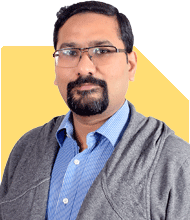Patrick Dsouza |1428 Answers |Ask -Follow
CAT, XAT, CMAT, CET Expert - Answered on May 23, 2024
Along with his wife, Rochelle, he trains students for competitive management entrance exams such as the Common Admission Test, the Xavier Aptitude Test, Common Management Admission Test and the Common Entrance Test.
They also train students for group discussions and interviews.
Patrick has scored in the 100 percentile six times in CAT. He achieved the first rank in XAT twice, in CET thrice and once in the Narsee Monjee Management Aptitude Test.
Apart from coaching students for MBA exams, Patrick and Rochelle have trained aspirants from the IIMs, the Jamnalal Bajaj Institute of Management Studies and the S P Jain Institute of Management Studies and Research for campus placements.
Patrick has been a panellist on the group discussion and panel interview rounds for some of the top management colleges in Mumbai.
He has graduated in mechanical engineering from the Motilal Nehru National Institute of Technology, Allahabad. He has completed his masters in management from the Jamnalal Bajaj Institute of Management Studies, Mumbai.... more

Hi! I am 26 years old (f)...have been working in digital marketing for last 2years but in really low salary with no growth in kolkata. I am thinking about pursuing MBA from a private university to give a boost in my career. Still having a little doubt about how the placement and other things will work as I will be 28 by then...? Kindly help me to understand.
You may like to see similar questions and answers below
Aashish Sood |127 Answers |Ask -Follow
CAT, Management Expert - Answered on May 30, 2024
Patrick Dsouza |1428 Answers |Ask -Follow
CAT, XAT, CMAT, CET Expert - Answered on Jun 03, 2024
Patrick Dsouza |1428 Answers |Ask -Follow
CAT, XAT, CMAT, CET Expert - Answered on Jun 18, 2024
Patrick Dsouza |1428 Answers |Ask -Follow
CAT, XAT, CMAT, CET Expert - Answered on Jul 21, 2025
Dr Shyam Jamalabad |107 Answers |Ask -Follow
Dentist - Answered on Dec 05, 2025
Dr Shyam Jamalabad |107 Answers |Ask -Follow
Dentist - Answered on Dec 05, 2025
Dr Dipankar Dutta |1836 Answers |Ask -Follow
Tech Careers and Skill Development Expert - Answered on Dec 05, 2025
Ulhas Joshi |280 Answers |Ask -Follow
Mutual Fund Expert - Answered on Dec 05, 2025
Dr Dipankar Dutta |1836 Answers |Ask -Follow
Tech Careers and Skill Development Expert - Answered on Dec 04, 2025
Ravi Mittal |676 Answers |Ask -Follow
Dating, Relationships Expert - Answered on Dec 04, 2025
Anu Krishna |1745 Answers |Ask -Follow
Relationships Expert, Mind Coach - Answered on Dec 04, 2025
Anu Krishna |1745 Answers |Ask -Follow
Relationships Expert, Mind Coach - Answered on Dec 04, 2025
Mayank Chandel |2562 Answers |Ask -Follow
IIT-JEE, NEET-UG, SAT, CLAT, CA, CS Exam Expert - Answered on Dec 04, 2025
Mayank Chandel |2562 Answers |Ask -Follow
IIT-JEE, NEET-UG, SAT, CLAT, CA, CS Exam Expert - Answered on Dec 04, 2025


























